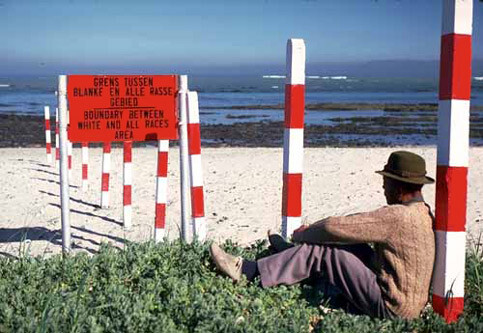The Electronic Intifada 15 August 2005

Before the end of Apartheid in South Africa in the early 1990s, most people did not believe that the whites of the country would be able to live under black-majority rule. History proved them wrong. (UN Photo)
In the history of the Palestinian-Israeli conflict, Israel, being the decidedly stronger party, has dictated the agenda and taken the initiative at every stage. It is Israel’s acceptance or rejection of initiatives, proposals, and resolutions that have mattered; Palestinian acceptance or rejection has not made an iota of difference in issues that matter. Israel has refused to let the Palestinian refugees go back to their homes, so no refugees went back home. Israel refuses to withdraw from occupied Palestinian land, so the occupation continues. The Israeli campaign to colonize and Judaize the occupied Palestinian territories through the building of Jewish settlements and the separation barrier continues unabated; Palestinian rejection and condemnation are no more than feeble noises in the background.
Successive Israeli governments have been able to define the struggle with the Palestinians in terms that are clearly and absolutely in their favor. Using Israel’s unmatched military power, they succeeded in creating the circumstances that facilitated the accomplishment of their goals. As long as the struggle was defined in military terms, the Palestinians had no chance of influencing the outcome because of the extreme disparity in the military balance.
For the Palestinians to move closer to achieving their national goal of freedom from the Israeli occupation, the focus of their struggle has to be shifted to areas in which the playing field is more even.
The efforts of Mahmoud Abbas, the President of the Palestinian Authority, at convincing his countrymen of the futility of a military confrontation with Israel constitute a significant breakthrough in the strategic thinking of the Palestinian leadership and a necessary first step in achieving Palestinian national rights.
On the public relations front, Israel has also taken the initiative and succeeded in portraying the struggle with the Palestinians in ethnic and religious terms while in reality it is a struggle of a colonized nation against a colonizing power. Taking the impending Israeli withdrawal from the Gaza Strip as the latest manifestation of this portrayal, there is a constant barrage of news and reports about the Jewish families that will be uprooted from the Gaza Strip, the fact that the Jews have no future in Gaza in the midst of a hostile Muslim Arab population, and that Hamas militants will loot and destroy Jewish homes and property left behind.
The Palestinian leadership has failed to articulate to the world that the hostility of the overwhelming majority of Palestinians to the Gaza settlers has nothing to do with their Jewishness but with their racist practices and violence against their Palestinian neighbors and the fact that, while they constitute a mere 0.5% of the population, they control 18% of the land of the extremely crowded territory.
Just as it has taken the initiative in producing a ceasefire that has deprived the Israeli military of the justification to attack Palestinian towns and refugee camps and to confiscate more Palestinian land, the current Palestinian leadership can take the initiative in the public relations arena by demonstrating that the struggle is not about ethnicity and religion but about national liberation.
The chances of success of such an initiative are heightened by the fact that a great amount of attention is currently focused on the Gaza Strip and the fate of the Jewish settlers there.
The Israeli government, following a tradition of dictating the agenda and retaining the initiative, is planning to leave the Strip this month. Its refusal to coordinate the pullout with the Palestinians has left the Palestinian leadership confused and helpless. Instead of watching helplessly and waiting for Israel to grant it permission to do this or that, why doesn’t the leadership seize the initiative and declare that if the settlers want to remain in Gaza and live in the territory as Palestinian citizens or even with dual Israeli-Palestinian citizenship, they are welcome to do so.
Many Palestinians will probably dismiss the idea out of hand, especially those who have suffered at the hands of the settlers. And of course many settlers would not want to live in Gaza as citizens of a Palestinian state for one reason or another. But it would not hurt the Palestinian leadership to make such a declaration. It has nothing to lose, and it’s more dignified than sitting and complaining about the lack of Israeli coordination. Furthermore, the Palestinians will not be blamed for the plight of the Gaza settlers and the future plight of West Bank settlers if more evacuations follow.
Before accepting the two-state solution in the late 1980s, the Palestinian leadership had consistently called for a secular state in Palestine in which Muslims, Jews, and Christians live together as equal citizens. By accepting the Jewish settlers of Gaza as equal citizens, the Palestinians can prove to themselves, to the Israelis, and to the world that they can treat their people as equal citizens before the law regardless of religion and ethnicity, something Israel has failed to do since its establishment. Furthermore, the presence of a Jewish community in Gaza could potentially serve to improve relations between an independent Palestinian state and Israel. If Israel can have Palestinian citizens, why can’t a Palestinian state have Jewish citizens?
What about the way the settlers have treated the Palestinians? Can the Palestinians forgive them for their actions before the Israeli pullout? Can Jews and Arabs live in Gaza as equal citizens of a Palestinian state? Before the end of Apartheid in South Africa in the early 1990s, most people did not believe that the whites of the country would be able to live under black-majority rule. History proved them wrong.
Munther Younes is senior lecturer Arabic Language and Linguistics at the Department of Near Eastern Studies at Cornell University Ithaca, NY.
Related Links

